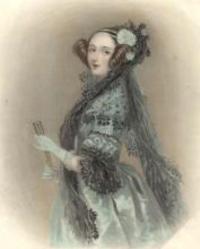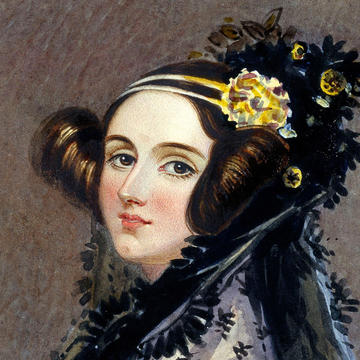Ada Lovelace

In 2015 the University of Oxford will celebrate the 200th anniversary of the birth of computer visionary Ada Lovelace. The centrepiece of the celebrations will be a display at the University of Oxford’s Bodleian Library (13 October – 18 December 2015) and a Symposium (9 and 10 December 2015), presenting Lovelace’s life and work, and contemporary thinking on computing and artificial intelligence.
For more information or to register see
http://blogs.bodleian.ox.ac.uk/adalovelace/
#lovelaceoxford
Ada, Countess of Lovelace (1815–1852), is best known for a remarkable article about Charles Babbage’s unbuilt computer, the Analytical Engine. This presented the first documented computer program, to calculate the Bernoulli numbers, and explained the ideas underlying Babbage’s machine – and every one of the billions of computers and computer programs in use today. Going beyond Babbage’s ideas of computers as manipulating numbers, Lovelace also wrote about their creative possibilities and limits: her contribution was highlighted in one of Alan Turing’s most famous papers ‘Can a machine think?’ Lovelace had wide scientific and intellectual interests and studied with scientist Mary Somerville, and with Augustus De Morgan, a leading mathematician and pioneer in logic and algebra.
The display, in the Bodleian’s new Weston Library, will offer a chance to see Lovelace’s correspondence with Babbage, De Morgan, Somerville and others, and her childhood exercises and mathematical notes. The Symposium, on 9th and 10th December 2015, is aimed at a broad audience interested in the history and culture of mathematics and computer science, presenting current scholarship on Lovelace’s life and work, and linking her ideas to contemporary thinking about computing, artificial intelligence and the brain. Confirmed speakers so far include Lovelace’s direct descendant the Earl of Lytton, Lovelace biographer Betty Toole, computer historian Doron Swade, historian Richard Holmes, computer scientist Moshe Vardi and graphic novelist Sydney Padua. Other activities will include a workshop for early career researchers, a “Music and Machines” event, and a dinner in Balliol College on 9th December, the eve of Lovelace’s 200th birthday.
Oxford’s celebration is led by the Bodleian Libraries and the University of Oxford’s Department of Computer Science, working with colleagues in the Mathematics Institute, Oxford e-Research Centre, Balliol College, Somerville College, the Department of English and TORCH. External sponsors include ACM, AdaCore, BCS, BCSwomen, Clay Mathematics Institute, google, Institute of Mathematics and its Applications, and the London Mathematical Society.
Oxford has a remarkable history of programming research, with two winners of the ACM A M Turing Award, the Nobel Prize for Computer Science, and the unique breadth and depth of Oxford’s expertise brings a variety of perspectives to understanding Lovelace and the remarkable intellectual community around her, whose ideas underpin modern computing.
For more information or to register see
http://blogs.bodleian.ox.ac.uk/adalovelace/
Professor Ursula Martin CBE
Professor of Computer Science
University of Oxford
Ursula.Martin@cs.ox.ac.uk
Ada Lovelace

A series of 9 events were held between October - December 2015
Symposium: Celebrating the Life and Legacy of Ada Lovelace
This Symposium, celebrating Ada Lovelace’s 200th birthday on 10th December 2015, was aimed at a broad audience of those interested in the history and culture of mathematics and computer science, presenting current scholarship on Lovelace’s life and work, and linking her ideas to contemporary thinking about computing, artificial intelligence and the brain.
Keynote speakers included:
- Richard Holmes, British Academy – Will you concede me Poetical Science?
- Doron Swade, Royal Holloway, University of London – Charles Babbage and Ada Lovelace: two visions of computing
- Betty Toole, Author – Ada Lovelace lives forever: Ada’s four questions
- Moshe Vardi, Rice University – ‘Humans, machines, and the future of work’
Celebrating Women in Computer Science
An event celebrating the life of a mathematician and scientific visionary who was tutored and mentored by Mary Somerville as well as women in science more generally.
Keynote speakers:
- Jennifer Widom (Fletcher Jones Professor and Chair of the Computer Science Department, Stanford University)
- Ursula Martin (CBE, Professor of Computer Science, University of Oxford)
Workshop: Texts and contexts: the cultural legacies of Ada Lovelace
An interdisciplinary workshop for graduates and early-career researchers.
Ada sketches by Emily Howard
A performance by Emily Howard and students of the Royal Northern College of Music organised by the Oxford e-Research Centre. The evening featured a performance of this short opera, a talk by Emily Howard, and the chance for audience members to participate in the composition of mathematical music, working with the musicians to turn "numbers into notes”.
Part of ‘The Lovelace Trilogy’ composed in 2011, ‘Ada Sketches’, a dramatic scena for mezzo-soprano (Ada), flute, clarinet and percussion, explores a musical solution to a computation as solved in the hypothetical 1842 Analytical Engine. Performed by RNCM Alumna mezzo-soprano Rosie Middleton and current RNCM students Lily Caunt (flute), German Martinez-Merino (clarinet), and Aiden Marsden (percussion).
Inaugural Annual Ada Lovelace Lecture
Lecture given by Professor Barbara LIskov of MIT, winner of the 2008 Turing Award.
Wikipedia: Women in Science (series of 4 workshops)
Celebrating the bicentenary of Ada Lovelace - part of a series of events hosted by IT Services and the Bodleian Libraries to celebrate the bicentenary of Ada Lovelace, the first computer programmer.
Each workshop focused on a particular area: Images, How to get articles showcased, How to create or improve Wikipedia articles and How to use Wikisource to create an electronic edition of a historic book.


